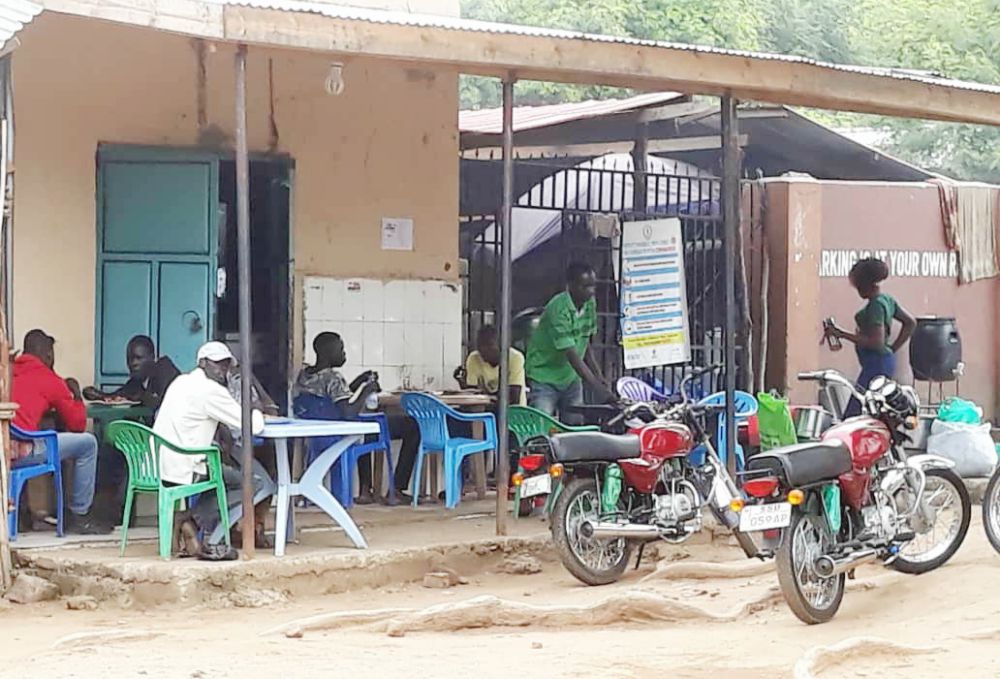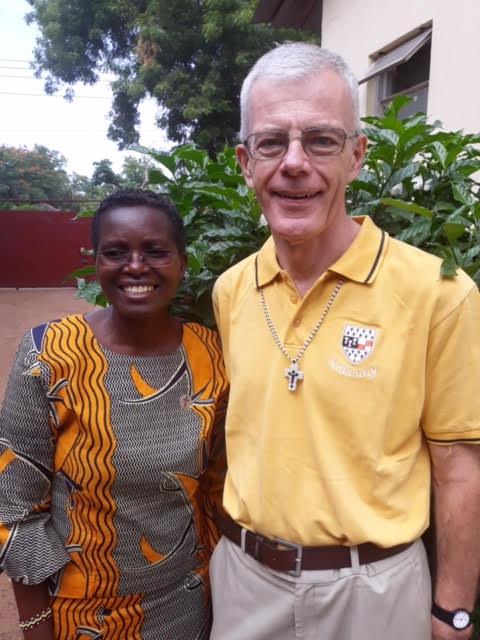
Some women earn a living by managing this food kiosk, which provides tea, maize and beans to passing businessmen on motorcycles in Juba, South Sudan. (Provided photo)
As the world grapples with responding to the COVID-19 pandemic, with its devastating consequences for individuals and communities, a major question occupies my mind: What critical opportunity does this story of tragic suffering and loss present for theological reflection?
This story is painful. I have been reflecting on it contemplatively, and with the mind of Jesus, trying to see God's presence in this crisis.
Our world is basically being shut down — it's a place we don't recognize anymore. Marketplaces are empty, shopping malls are running out of stock, and our churches are empty — in fact, closed. It feels like the end of the world.
I would like to know the plans God has for us in this pandemic. And with the government restrictions and rules! As critical as social distancing is to help stop the spread of the virus, I am struggling with this practice. But what if all this is to draw me into an intimate relationship with God?
Scripture reveals that God's best work is often done in people who have distanced themselves from society for a period of time. Think of the Prophet Elijah finding deep intimacy in a still small voice in his cave of loneliness (1 Kings 19:11-13). Think of Jesus finding intimate fellowship with the Father during his 40 days' wilderness fasting (Mark 1:12-13). Could God be taking us away from all forms of distractions in order to bring us to a place of seclusion to hear God's voice once more? God's Presence is often hidden, a Presence that needs to be discovered.
Coming from an African culture where we value hugging and hand-shaking, I have found the advice not to shake hands quite unsettling. On reflecting on the hand-shaking practice, now more than ever before I believe that personal touch points to the Incarnation. God did not save us with a decree from heaven. God's only Son came to dwell among us. It was about embodiment. It was about touch. Jesus touched lepers and they were healed and became whole.
As members of Christ's body, reaching our hands out to those in need, we become aware of the healing we bring. Reflect on how we touch others — even the gestures we use — especially with the most vulnerable in our society. How do we reach out and touch the other within the limits of COVID-19 restrictions?
Advertisement
This time of social distancing reminds us of the centrality and importance of personal touch in the community, a place where all are uniquely valued. Referring to the pandemic, on Divine Mercy Sunday Pope Francis said that this is "an opportunity to prepare for our collective future, a future for all without discarding anyone."
Forbidden Mass attendance has made it clear how vital faith is to our lives. Many people are now starving to be fed with the word of God and the Body of Christ. Though participating in Mass via internet or some form of social media is spiritually supportive in these days of anxiety, nothing can replace the healing balm of the Eucharist and the sacraments.
The new reality of doing without Sunday Mass is strange and disheartening. Reflecting on the closed church doors and canceled Masses, what has given me hope is the fact that it is impossible to close church as the people of God. My faith goes beyond the walls of the church building, allowing me to build strength to support serenity, healthy relationships, and a better ability to bounce back when COVID-19 presses down hard.
We are the church — whether dispersed in the world, inside our homes or watching our services on livestream. My faith community brings me a sense of peace, even when we cannot worship together. Though our parish parking lot may be empty for months, we are still the living embodiment of the Gospel wherever we go.
As COVID-19 disease smashes the long-revered idol of wellness, the virus teaches the important lesson that no one is exempt from the possibility of infection. We are all equal, precious and fragile. This pandemic is forcing all of us to look straight into the eyes of our own fragility. Our bodies are not bionic. Even with an optimal regimen of diet, exercise and sleep, they eventually break down and we die.

Congregation of Mercy Sr. Scholasticah Nganda with Missionaries of Africa Fr. Jim Greene, executive director of Solidarity with South Sudan (Provided photo)
Since being missioned to Solidarity with South Sudan, I am now more conscious of my own mortality than when I lived in Kenya or in Ireland. South Sudan is a fragile country struggling to emerge from decades of civil war; thousands of families live below poverty level with no hope of ventilators for COVID-19 patients. We all live within divinely imposed limits, even as we long for God to make all things well in the resurrection.
The spreading virus plunges us into a global health crisis; we are only at the early stages in some parts of the world. No doubt this pandemic is going to reshape economy, society and politics permanently. Its effects — rippling through all known systems — have a noticeable impact on global economic growth. Doesn't this remind us anew of the fragility of world systems? Yet, sometimes we live as if our life entirely depended on these systems.
As we live through this let us draw inspiration from Paul: "For we know that all creation has been groaning as in the pains of childbirth right up to the present times" (Romans 8:22). Is this pandemic the pains of childbirth and groaning that Paul describes? Ask any mother and she will admit that the pains of childbirth eventually succumb to the birth of new life, a glorious moment. By his cross and resurrection, Jesus will eventually restore our broken world for we believe God makes all things new (Revelation 21:5).
In these days of doubt and questioning, negative news is utterly pervasive — exposing us consciously and unconsciously to much more of the downside of the pandemic than any appreciable upside. We may not easily understand or accept God's presence in the COVID-19 disease, but let's trust that God will care for us and enable us to find spiritual calm when all else is in turmoil.
This pandemic presents our community of faith with an opportunity to witness how the Spirit works, no matter what else is falling apart around us. This is immensely comforting, a tremendous antidote to panic! Our faith invites us to respond to this pandemic in creative and unique ways, born of love, compassion and self-giving.
Let us choose to expand our compassion and be bearers of hope in the midst of pain and suffering. Only this way will we change this story of pain and suffering to be one of compassion and communion.
Be safe!
[Scholasticah Nganda is Kenyan by birth and a member of the Congregation of the Sisters of Mercy. She is now serving as the director of pastoral programs for Solidarity with South Sudan, Juba, and is one of four members of the Solidarity Pastoral Team working in collaboration with the Catholic Bishops Conference of South Sudan to meet the pastoral needs of the church there.]
Editor's note: The author wishes to credit Missionaries of Africa Fr. Jim Greene for helping her with this column. Greene is the executive director of Solidarity with South Sudan, and worked in Malawi, Ireland, Italy and Israel before coming to Juba, South Sudan. He was also in the leadership of his congregation in Rome.







